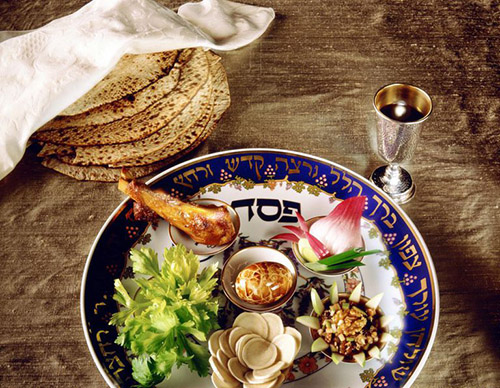
You may have heard many beautiful ideas about what the theme(s) of Pesach is, what Pesach stands for, what it reminds us of, etc. Some might say it’s about freedom and liberty, some might say it’s about going from one slavery to another form of servitude, some might say it’s about family and bonding, some might say it’s about receiving the Torah, some might say it’s about recognizing Hashem runs the world, some might say it’s about believing in miracles, and some might say it’s about imagining our own personal salvations and geula. But I thought more deeply about it, that perhaps there is a much more foundational idea of what Pesach truly is about.
Let’s go back to where the word “Pesach” first appears in the Torah. The word Pesach first appears in regards to the korban Pesach the Jews were instructed to be involved with. Why was it called a korbon Pesach? Rashi explains because the word pesach means to skip/jump over. By the 10th plague of makat bechorot, Hashem skipped over the Jewish people so they wouldn’t be killed in the plague. Hashem foretold the Jewish people וּפָֽסַחְתִּ֖י עֲלֵכֶ֑ם, and I will skip over you. Rashi (in his first explanation) comes and says וּפָֽסַחְתִּ֖י means “and I will have compassion.” We perhaps see from here that Hashem’s idea of pesach is an idea of His compassion toward the Jewish people. The korban Pesach was a (perhaps delicious) symbol of Hashem’s love for the Jewish people. And if I may say, I think the mehus (the essence) of Pesach might be exactly that message: coming to a greater understanding of how much Hashem loves us. All those other aforementioned ideas naturally fall into place once this understanding is recognized.
I heard a penetrating story by Rabbi Ephraim Wachsman that really brings out this idea: Rabbi P’dan was in charge of the bikur cholim in Tel Aviv. He related that one time he got a phone call from a nurse in the hospital, saying that he should come immediately as there is someone who is close to dying. He came right away and saw the man gasping, breathing very heavily. Rav P’dan asked him, “Do you have any family here?” The patient said no. “Any kids?” No. “No children at all?” “Well, I have a son, Dovid, in America but we are not in touch. “Why?” asked Rav P’dan. “Well, when I got married we had a hard time having children. Finally we had my son, Dovid, and a number of years later my wife got very sick. My son would call his mother and say, ‘Mommy, you promised me you would come home.’ She said, ‘I promise I will.’ Indeed, she came home, but not in the way he expected: in a chevra kadisha van. My son and I had a difficult time going forward. I did not know how to deal with him regarding his mother’s death. We had conflicts, arguments and soon he left the house, joined the wrong crowd and ended up marrying a non-Jewish woman, and now he has six kids.” Rav p’dan asked, “Do you have his number? I am going to call him right now.” Rav P’dan tried to call but he could not get through. It happened to be that while he was calling, Dovid was in the jewelry store buying a piece of jewelry for his non-Jewish wife. Rav P’dan tried calling again but no success. The patient, Dovid’s dying father said, “Please, please get through to him!” He tried again but no success. Unfortunately, right then the father passed away. Soon after, Rav P’dan got a call back from Dovid: “Hello? I got a call from this number.” Rav P’dan introduced himself and related that his father just died. Dovid said, “Well, why are you calling me?” Rav P’dan said, “I think you should come to the levaya.” Dovid came to the levaya and asked Rav P’dan, “What did my father do right before his passing? Did he say Shema? Did he say Viduy?” “No,” said Rav P’dan, “none of those. All he was saying was, ‘Where is my Dovid? I want to speak with my Dovid.” Dovid then took that piece of jewelry he still had that he planned to give to his wife and threw it on the floor and said, “If only I knew how much my father wanted me.”
If only we knew how much our Father in heaven wants us. If only we knew how much Hashem really cares for each Jew, and how His love for each Jew is infinitely deep. So many people are going through their own slaveries, difficult hardships, their own figurative galut Mitzrayim. And in those times, much like Dovid, sometimes a person may lose sight of how much his or her Father in Heaven is waiting for them to turn to Him, to reach out, to daven, to pray, to call out, to express, to shed a tear, to connect somehow. Pesach indeed teaches us that Hashem runs the world, that He is in constant control of nature and the happenings of the world. But it also teaches us a much more personal message: that at all times Hashem is right on the scene, always with us, and His love for us is more than we can imagine. Hashem is not just our Father in heaven; He is also our Father on earth. This bitachon, our trust in Hashem’s infinite love and compassion for each of us is, I think, perhaps the very essence of Pesach.
By Binyamin Benji
Binyamin Benji learns in Yeshivas Rabbeinu Yitzchak Elchanan. He holds an MSW and is the author of the weekly Torah Talk in the Sephardic Congregation of Paramus’ newsletter. He can be reached at [email protected].













